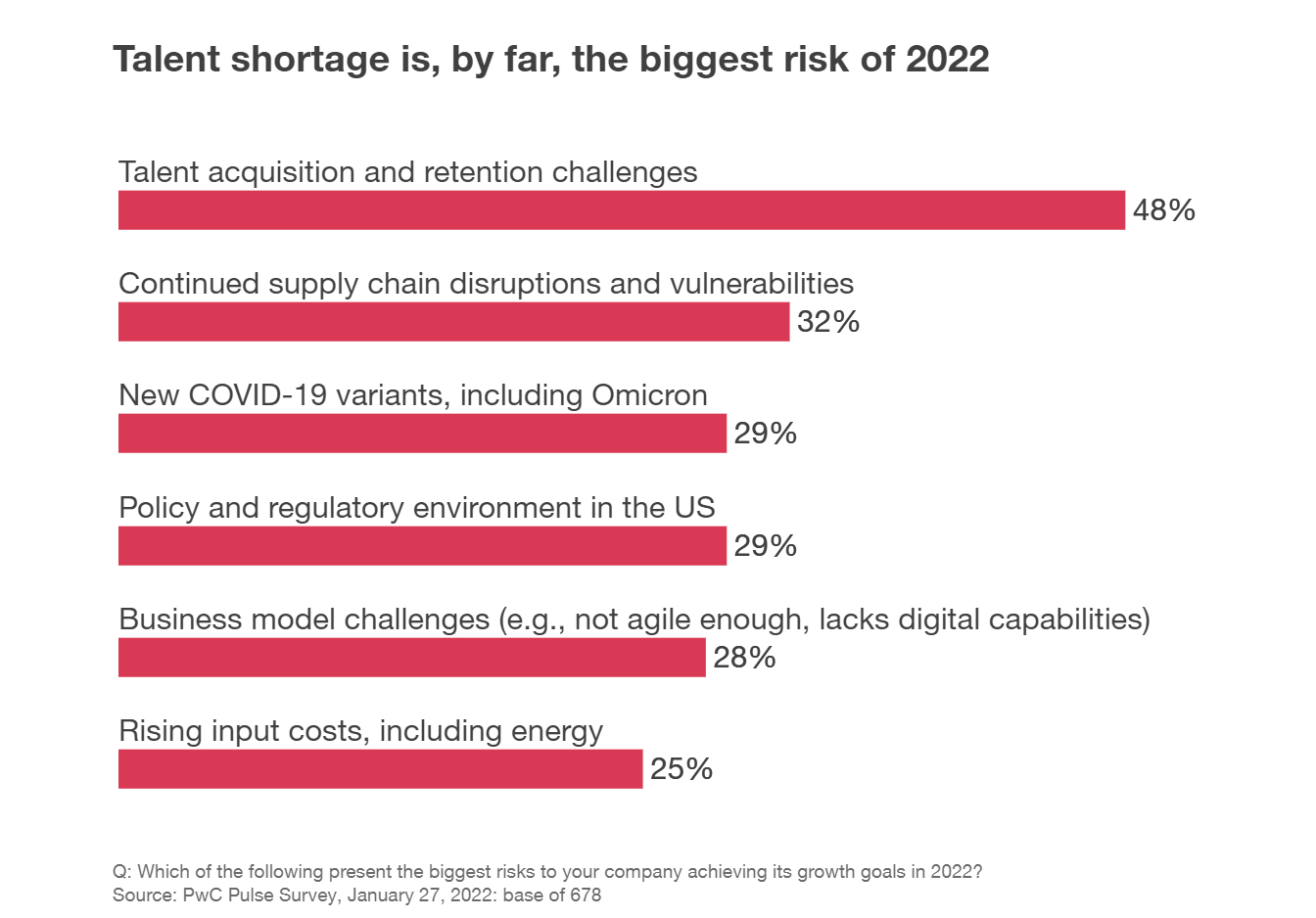We have seen a power shift from employers to employees
February 28, 2022
Julia Lamm, Global Workforce Strategy Leader and Principal at PwC United States, feels that, among other areas, the pandemic has highlighted the importance of meaningful work and career paths for the new employee experience.
Why, pre-pandemic, was EX more often than not seen as secondary to CX?
I think the biggest aspect was cost pressure from a variety of things – investors, regulatory change, changes post-merger, the list goes on. When you think about companies who are creating products for customers, think about Exchange Traded Funds (ETFs) and the race to zero fee environment, there’s no money left to drive employee experience when you’re taking so much out of the pricing model of what you’re charging the customers.
We used to see a lot of companies have onboarding events for their campus hires. With the augment of technology they were able to do a lot of those things more virtually and cut costs; rather than have people travel, so they could get people the training and do some of the things they need to do virtually. Similarly, a lot of companies have been saying, ‘Hiring and recruiting, can we do that virtually, do we need to go interview in person to really get a sense for the individual?’
This automation and streamlining has been a big area of cost cutting. You think automation will improve the employee experience, but on the way it’s very bumpy!
How has the pandemic altered EX?
The pandemic accelerated hybrid and remote working, which meant employers and employees were forced to work differently than they were previously used to. More recently, the key driver has been the great resignation, and the power shift from employers to employees.
Whilst the market is still hot, you’ll see that dynamic sustain. If the market flips, and inflationary pressures change where companies are investing and their growth outlooks, there may not be so many jobs and employees may start to feel very anxious, like they don’t have other options.
One interesting dynamic we’re seeing is shifting generational preferences between millennials and Gen Z. As Gen Z come into the workforce, one thing that they’re looking for increasingly is security. They have been entering the workforce through COVID, with anxiety about if they would be able to find and retain a job.
There’s much less flexibility for this generation. One of the key characteristics they look for in an employer is stability, which is probably good for financial services companies that tend to want to attract and retain talent for a while. But that changing dynamic, it’s driving companies to really look differently at how they’re retaining talent and treating their employees, in particular putting more focus on mental health and wellbeing.
What are the key aspects for the new EX?
In the current external environment, employees have the power to be able to say, ‘I can leave if I want’, and the current employer-employee dynamic means they can say, ‘there’s a lot of things we want to do differently.’
Mental health and wellbeing is a concern. Hybrid, of course is a big opportunity, and most of our survey data does point to people wanting more hybrid options, versus full-time remote, or full-time in person. We also can’t ignore pay adjustments that many companies have made.
One key concept is that of meaningful work. Throughout the pandemic many people went through low points and were left wondering, ‘is this job fulfilling?’ So making sure they see the meaning in the work is key. This means employees connecting to the company’s overall purpose and values, but also their simply day-to-day work – is someone actually looking at the work, do they feel they are contributing?
The final one is career paths and skills investment. We’re seeing employees say, ‘I don’t feel like I’m getting long-term opportunities’, or ‘I don’t have access to learn and practice new, more digital skills with my current organisation – I’m worried my skillset is going to get outdated.’ So we’re seeing people move on that front too.
If businesses don’t pay attention to the new EX, what do you think will be the effect on those businesses?
It’s sacrificing potential growth, but it’s also massively impacting costs. We are implementing a new Enterprise Resource Planning (ERP) system for one of our global clients. The company is going through acquisition, and they don’t have a very clear employment value proposition. As such, they are seeing people vote with their feet, and leave.
As a result, almost the entire team that we interact with is new. They don’t know the organisation’s business processes, they’re onboarding, they don’t know who to connect to. The project has been delayed by multiple months and the cost has spiralled because of these delays. Not only is there the extensive additional cost, but the business benefits of a new system – better collaboration, better visibility into operating costs and your talent – have been delayed. Those are things you need to allow for growth.
Executives are starting to, as our Executive Pulse survey showed, recognise that talent acquisition is the biggest risk to their company’s growth, but we’re not seeing companies recognising it in their financial projections and looking at increased costs. There’s more to be done in how companies are reporting the impact of this.

How important is it for the new EX that employees are able to give feedback on a much more regular basis, and that employers are able to see this feedback, as opposed to the traditional once-per-year feedback appraisal?
I feel that this has been happening since before the pandemic. But the shift that the pandemic has really driven towards is discussion around how you are measuring performance. Is it the number of hours someone is working for, or is it measuring more performance outcomes?
Feedback is really critical. People want feedback so they can learn, and grow, and feel like they’re contributing well. If they don’t get that feedback from managers, they will show their dissatisfaction by exploring alternative opportunities, especially as there’s no barrier to leaving a company now, you don’t have to wear a suit and sneak out for your interview, you can just do it over Zoom.
But I will also highlight a unique nuance to this is – the pressure on managers when giving feedback. Pre-pandemic, managers might be giving good feedback, but they might be giving it very bluntly. Now managers are very conscientious of the effect of feedback on their employees, they want to give the feedback, but not create stress and anxiety. There is almost a disincentive to giving really critical feedback because you’re so worried about upsetting employees.

